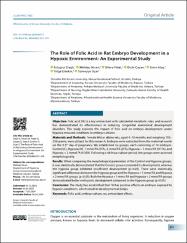The Role of Folic Acid in Rat Embryo Development in a Hypoxic Environment: An Experimental Study

Göster/
Erişim
info:eu-repo/semantics/openAccessTarih
2024Yazar
Dağlı, ErtuğrulNisari, Mehtap
Patat, Dilara
Çayan, Dicle
Atay, Emre
Ertekin, Tolga
Uçar, Sümeyye
Üst veri
Tüm öğe kaydını gösterÖzet
Objective: Folic acid (FA) is a key antioxidant with substantial metabolic roles, and research has demonstrated its effectiveness in reducing congenital anatomical development disorders. This study explores the impact of folic acid on embryo development under hypoxia-induced conditions in embryo cultures. Materials and Methods: Female Wistar albino rats, aged 4-10 months and weighing 150- 250 grams, were utilized for this research. Embryos were extracted from the maternal womb on the 9.5 (th )day of pregnancy. We established six groups, each consisting of 10 embryos: Control (C), Hypoxia (H), 1 mmol FA (1FA), 2 mmol FA (2FA), Hypoxia + 1 mmol FA (H1FA), and Hypoxia + 2 mmol FA (H2FA). Following a 48 -hour culture period, the groups were assessed morphologically. Results: When comparing the morphological parameters of the Control and Hypoxia groups, it was statistically demonstrated that the Control group completed its development, whereas the Hypoxia group exhibited insufficient development (p<0.05). There were statistically significant differences between the Hypoxia group and the Hypoxia + 1 mmol FA and Hypoxia + 2 mmol FA groups (p<0.05). Both the Hypoxia + 1 mmol FA and Hypoxia + 2 mmol FA groups demonstrated better embryonic development compared to the Hypoxia group (p<0.05). Conclusion: The study has established that FA has positive effects on embryos exposed to hypoxic conditions, which result in developmental delays.

















